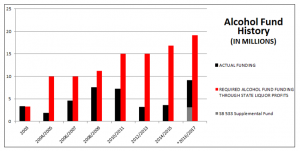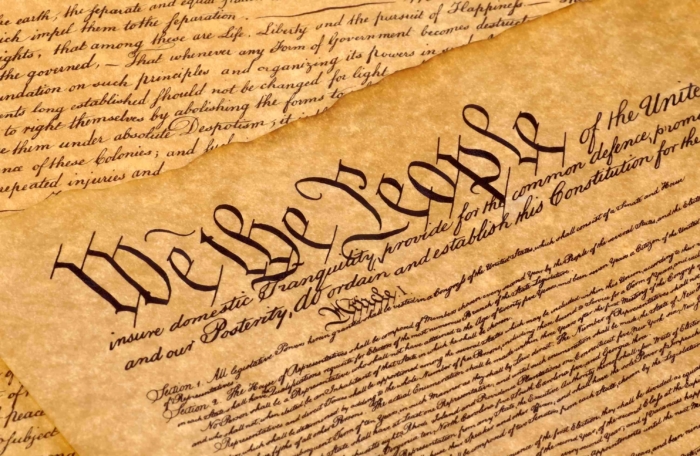Why a constitutional amendment is needed to restore taxpayer standing
to challenge illegal spending
By Andrew Cline
On Sept. 1, 2015, Manchester’s Board of Mayor and Aldermen approved a contract with the city’s teachers union that included a pay raise. Three aldermen with immediate family members employed as city teachers voted for the contract, in direct violation of the city charter’s conflict of interest provision. (1)
Just five years earlier, taxpayers would have been able to challenge such an illegal vote at the state Supreme Court. For 147 years, New Hampshire taxpayers had the right to petition the court for opinions on the legality of alleged unlawful government expenditures.
As the court put it in Clapp v. Jaffrey (1953), “it is plain that every taxpayer of a town has a vital interest in and a right to the preservation of an orderly and lawful government regardless of whether his purse is immediately touched.” (2)
In Green v. Shaw (1974), nine members of the Portsmouth City Council had sought a judgement against the mayor and 291 municipal officials for numerous alleged violations of law that included the illegal expenditure of taxpayer funds. After making the initial complaint, six of the nine petitioners went off the council, so they brought the case to the court as taxpayers. (3)
“It is well settled in this State that plaintiffs, as taxpayers, have standing to seek redress for the unlawful acts of their public officials,” the court ruled in allowing the petition.
But in a 2010 case called Baer vs. New Hampshire Department of Education, the state Supreme Court summarily threw out a century and a half of established practice and its own legal precedents. It declared that ”taxpayer status, without an injury or an impairment of rights, is not sufficient to confer standing to bring a declaratory judgment action” under the state statute that had long authorized exactly what the court suddenly decided it no longer authorized. (4)
After Baer, legislators amended the statute to clarify that it allows taxpayer standing, but in 2014 the court ruled in Duncan v. State of New Hampshire, struck down that amendment, arguing that it violated Part II, Article 74 of the New Hampshire Constitution, which states that the court can issue advisory opinions to other branches of government. Though that provision doesn’t forbid the court from issuing those opinions to individuals, the court interpreted it as allowing opinions to be given only to the Legislature, governor and Executive Council. (5)
That interpretation, however, ignores the plain language of Part II, Article 4, which grants the Legislature the “full power and authority to erect and constitute judicatories and courts of record, or other courts, to beholden, in the name of the state, for the hearing, trying, and determining, all manner of crimes, offenses, pleas, processes, plaints, action, causes, matters and things whatsoever arising or happening within this state.…” (6)
The Legislature clearly has the “full power and authority” to “beholden” the courts for hearing “all manner of…things whatsoever….” That is not ambiguous. The Legislature can task the court with hearing any case, plea, action, etc.
Consistent with the Legislature’s constitutional authority, RSA 491:22 tasks the court with hearing taxpayer petitions for relief from illegal government acts. It states that “any taxpayer in the jurisdiction of the taxing district shall have standing to petition for relief under this section when it is alleged that the taxing district or any agency or authority thereof has engaged, or proposes to engage, in conduct that is unlawful or unauthorized, and in such a case the taxpayer shall not have to demonstrate that his or her personal rights were impaired or prejudiced.” (7)
RSA 491:22 is a remarkable statute. In it, legislators voluntarily checked their own power. They granted taxpayers a means of holding state and local government officials accountable should they break the law.
With the Baer and Duncan decisions, the New Hampshire Supreme Court eliminated a vital check on government power that had been used numerous times over the course of nearly1.5 centuries.
Just a few weeks ago, Hillsborough County Superior Court Judge Charles Temple cited the Duncan case in ruling that Nashua taxpayers didn’t have standing to challenge a city action that violated the tax cap. (8)
Legislators have proposed restoring the original understanding of taxpayer standing by passing a constitutional amendment, CACR 15. (9)
It would amend Part 1, Article 8 of the New Hampshire Constitution by adding the following language:
“The public also has a right to an orderly, lawful, and accountable government Therefore, any individual taxpayer eligible to vote in the State shall have standing to petition the Superior Court to declare whether the State or political subdivision in which the taxpayer resides has spent, or has approved spending, public funds in violation of a law, ordinance, or constitutional provision. In such a case, the taxpayer shall not have to demonstrate that his or her personal rights were impaired or prejudiced beyond his or her status as a taxpayer. However, this right shall not apply when the challenged governmental action is the subject of a judicial or administrative decision from which there is a right of appeal by statute or otherwise by the parties to that proceeding.”
This clarifying language is not radical. It would restore the constitutional status quo that existed from 1863-2010 and gave taxpayers the ability to challenge illegal government expenditures.
Without a constitutional amendment to restore taxpayer standing, the public will have no recourse when the state or a local government spends money illegally. A vital check on government abuses of power will remain lost, and illegal spending will become more common as government officials learn that they can break the law with impunity.
Andrew Cline is president of the Josiah Bartlett Center for Public Policy.
Endnotes
- Manchester City Charter, Section 9:03 (e): “Conflict of interest. No city official shall participate in the decision-making process of any matter in which the official or a member of the official’s immediate family has a direct personal or financial interest. Any official who believes such an interest exists shall disclose such interest and shall not participate in the matter further.”
- Clapp v. Jaffrey, N.H. Supreme Court, Oct. 9, 1952.
- Green v. Shaw, N.H. Supreme Court, April 30, 1974
- Baer v. New Hampshire Department of Education, Sept., 24, 2010.
- Duncan v. The State of New Hampshire, Aug. 24, 2014.
- “How the Supreme Court got the Duncan case wrong and eliminated taxpayer suits — part 2,” New Hampshire Trial Bar News, Fall 2017.
- RSA 491:22
- “Judge declares plaintiffs in Nashua spending cap suit have no standing,” New Hampshire Union Leader, Feb. 13, 2018.
- CACR 15, 2018 Session, New Hampshire General Court.
 If you live in New Hampshire and enjoy wine, there’s something you should know (besides how approach a tasting). Your own state government, which sells wine, wants to be your primary supplier. Really, it wants to be your only supplier, but the Legislature won’t allow that. So to satisfy its impulse to smash all enemies, it’s rigging the wine market to kneecap upstart competitors.
If you live in New Hampshire and enjoy wine, there’s something you should know (besides how approach a tasting). Your own state government, which sells wine, wants to be your primary supplier. Really, it wants to be your only supplier, but the Legislature won’t allow that. So to satisfy its impulse to smash all enemies, it’s rigging the wine market to kneecap upstart competitors.







